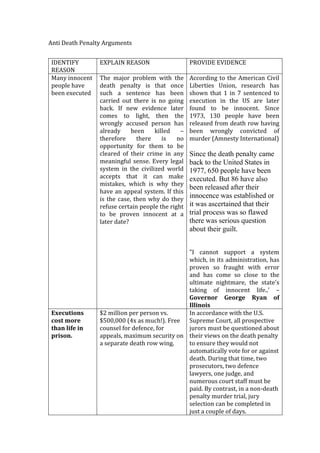Anti dp
- 1. Anti Death Penalty Arguments<br />IDENTIFY REASONEXPLAIN REASONPROVIDE EVIDENCE Many innocent people have been executed The major problem with the death penalty is that once such a sentence has been carried out there is no going back. If new evidence later comes to light, then the wrongly accused person has already been killed ŌĆō therefore there is no opportunity for them to be cleared of their crime in any meaningful sense. Every legal system in the civilized world accepts that it can make mistakes, which is why they have an appeal system. If this is the case, then why do they refuse certain people the right to be proven innocent at a later date?According to the American Civil Liberties Union, research has shown that 1 in 7 sentenced to execution in the US are later found to be innocent. Since 1973, 130 people have been released from death row having been wrongly convicted of murder (Amnesty International)Since the death penalty came back to the United States in 1977, 650 people have been executed. But 86 have also been released after their innocence was established or it was ascertained that their trial process was so flawed there was serious question about their guilt.quot; I cannot support a system which, in its administration, has proven so fraught with error and has come so close to the ultimate nightmare, the state's taking of innocent life..ŌĆÖ ŌĆō Governor George Ryan of IllinoisExecutions cost more than life in prison.$2 million per person vs. $500,000 (4x as much!). Free counsel for defence, for appeals, maximum security on a separate death row wing.In accordance with the U.S. Supreme Court, all prospective jurors must be questioned about their views on the death penalty to ensure they would not automatically vote for or against death. During that time, two prosecutors, two defence lawyers, one judge, and numerous court staff must be paid. By contrast, in a non-death penalty murder trial, jury selection can be completed in just a couple of days.Many Death Row inmates were convicted while being defended by court-appointed lawyers who are often the worst-paid and most-inexperienced and least-skillful lawyers.┬ĀThe American Bar Association published guidelines for a good defense in a death penalty case: (a) attorneys with prior experience working a capital case, (b) 2 attorneys, 1 investigator, 1 mitigation specialist, and (c) fully funded to pay for travel, private eyes, evidence testing and other things needed to investigate the case. Yet no state meets these standards. And few states pay their state-appointed lawyers well enough to retain competent, effective lawyers.In Texas last year, for example, the Court of Appeals upheld the death penalty of a young man whose lawyer slept through his trial.Is not a deterrent; crime rates have not gone down.Yes, it has no effect whatsoever on crime rates. It doesnŌĆÖt help at all. In fact, the murder rate in the US is 6 times that of Britain and 5 times that of Australia. Neither country has the DP. Texas has twice the murder rate of Wisconsin, a state that doesn't have the DP. Texas and Oklahoma have historically executed the most number of DR inmates, yet in 2003 their state murder rates increased, and both have murder rates higher than the national average.A springboard used fraudulently to further people's careers (esp politics)A prosecutor is often ambitious and moving up. When he is given the opportunity to prosecute a defendant in an alleged murder he sees a grand opportunity. He caters to the public's feeling of wanting revenge for a murder, an eye for an eye, so he knows that he will be cast in a favorable public light in the case of a death penalty sentence. From there on out, he will be seen as a hero who has ridden society of a terrible person.Mumia Abu-Jamal is a black journalist who has been on Pennsylvania's death row for 19 years.In Mumia's case, the judge who presided over his case, Judge Sabo, was up for re-election the next year, and there was no way he could have won re-election by turning loose an alleged cop-killer. And the district attorney, Edward Rendell, went on to become a mayor as well as the chairman of the Democratic Party.Death sentences are handed down arbitrarily, not in a fair manner.┬ĀFor people who do not have enough money to hire a good lawyer, they would most probably to be executed. It is also discriminatory and is often used disproportionately against the poor, the powerless and the marginalized, as well as against people whom repressive governments want to eliminate.Serial killers such as the infamous Gary Ridgway in Seattle who admitted killing 48 prostitutes and runaways got life imprisonment. Meanwhile, mentally ill and impoverished murderers who could not afford good lawyers and did not warrant much media attention were given the death penalty. In Alabama, David Hocker was executed after a one-day trial. His mental illness was not sufficiently described to the jury. Alabama also executed a 74-year-old man┬Ā(James Hubbard) who had been on DR for 27 years and was beset by medical problems, which would have probably, soon caused his death by natural means: cancer, high blood pressure and the early stages of Alzheimers. In Texas, a man with schizophrenia was executed (Kelsey Patterson) even after the Board of Pardons and Paroles recommended clemency after learning of his time spent in mental hospitals and his unintelligible rambling.<br />


